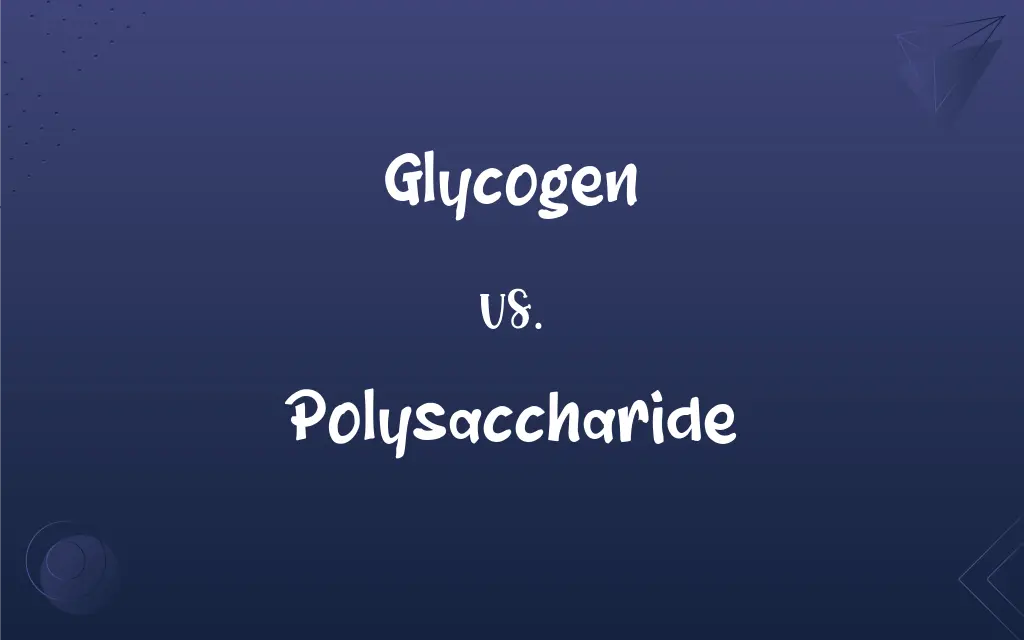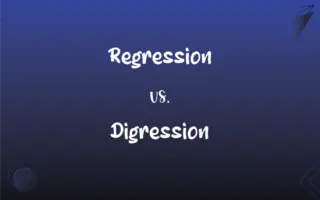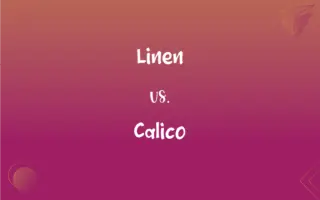Glycogen vs. Polysaccharide: What's the Difference?
Edited by Janet White || By Harlon Moss || Updated on November 22, 2023
Glycogen is a complex carbohydrate stored in animals for energy. Polysaccharide is a carbohydrate molecule consisting of long chains of monosaccharide units.

Key Differences
Glycogen is a specific type of polysaccharide that serves as the primary storage form of glucose in animals and fungi. Polysaccharides, in general, are carbohydrates formed from long chains of monosaccharides.
Glycogen is characterized by its structure, which is highly branched and compact, allowing for rapid mobilization of glucose. Polysaccharides can have varying structures, from linear to highly branched, and include substances like cellulose and starch.
In glycogen, the glucose units are linked by α(1→4) glycosidic bonds, with branches formed by α(1→6) bonds. Polysaccharides can have different types of glycosidic bonds, influencing their structure and function.
Glycogen is synthesized and stored mainly in the liver and muscle tissues in humans. Polysaccharides, depending on their type, are found in a wide variety of biological contexts, including plant cell walls (cellulose) and food reserves in plants (starch).
The primary role of glycogen is to provide a readily available source of energy during periods of high demand. Polysaccharides, while also often serving as energy sources, have diverse functions, including structural support in plants and invertebrates.
ADVERTISEMENT
Comparison Chart
Definition
A storage form of glucose in animals and fungi.
Carbohydrates composed of long monosaccharide chains.
Structure
Highly branched, compact.
Varies, from linear to branched.
Glycosidic Bonds
α(1→4) and α(1→6) for branches.
Varies, influencing structure and function.
Primary Locations
Liver and muscle tissues in animals.
Diverse, including plant cell walls and food reserves.
Main Function
Energy storage for rapid mobilization.
Energy storage, structural support, etc.
ADVERTISEMENT
Glycogen and Polysaccharide Definitions
Glycogen
A storage form of glucose in animals.
Glycogen levels in the liver are crucial for maintaining blood sugar levels.
Polysaccharide
A large molecule made of many sugar units.
Starch, a type of polysaccharide, is used by plants for energy storage.
Glycogen
An energy source for animals.
During exercise, muscle glycogen is broken down for energy.
Polysaccharide
Diverse compounds with varied biological roles.
Chitin, a polysaccharide, provides structural support in the exoskeleton of insects.
Glycogen
A polymer of glucose units.
Glycogen synthesis occurs after carbohydrate-rich meals.
Polysaccharide
Complex carbohydrates in various forms.
Polysaccharides are crucial in the diet for sustained energy release.
Glycogen
A branched polysaccharide of glucose.
After a meal, excess glucose is stored as glycogen in the body.
Polysaccharide
Carbohydrates formed by long chains of monosaccharides.
Cellulose, a polysaccharide, is a major component of plant cell walls.
Glycogen
A carbohydrate reserve in muscles and liver.
Athletes often increase their glycogen stores before a competition.
Polysaccharide
Molecules that can be linear or branched.
The polysaccharides in dietary fiber are important for digestive health.
Glycogen
A polysaccharide, (C6H10O5)n, that is the main form of carbohydrate storage in animals and is found primarily in the liver and muscle tissue. It is readily converted to glucose as needed by the body to satisfy its energy needs. Also called animal starch.
Polysaccharide
Any of a class of carbohydrates, such as starch and cellulose, consisting of a number of monosaccharides joined by glycosidic bonds.
Glycogen
(carbohydrate) A polysaccharide that is the main form of carbohydrate storage in animals; converted to glucose as needed.
Polysaccharide
(carbohydrate) A polymer made of many saccharide units linked by glycosidic bonds.
Cellulose, starches, and complex carbohydrates, such as glycogen, are common polysaccharides in biology.
Glycogen
A white, amorphous, tasteless substance resembling starch, soluble in water to an opalescent fluid. It is found abundantly in the liver of most animals, and in small quantity in other organs and tissues, particularly in the embryo. It is quickly changed into sugar when boiled with dilute sulphuric or hydrochloric acid, and also by the action of amylolytic ferments.
Polysaccharide
Any of a class of carbohydrates whose molecules contain chains of monosaccharide molecules
Glycogen
One form in which body fuel is stored; stored primarily in the liver and broken down into glucose when needed by the body
FAQs
What are the main functions of glycogen?
Glycogen serves as a primary form of energy storage in the body.
What is a polysaccharide?
A polysaccharide is a type of carbohydrate consisting of a large number of sugar molecules bonded together.
What is glycogen?
Glycogen is a complex carbohydrate stored in animals and humans, primarily in the liver and muscles.
Is glycogen a polysaccharide?
Yes, glycogen is a type of polysaccharide.
What is the significance of glycogen in diabetes management?
In diabetes, managing glycogen breakdown and synthesis is crucial for regulating blood sugar levels.
Can you name other polysaccharides besides glycogen?
Other examples include cellulose, starch, and chitin.
Are all polysaccharides digestible?
No, some polysaccharides like cellulose are not digestible by humans.
How is glycogen structured?
Glycogen is structured as a branched polymer of glucose units.
What role do polysaccharides play in plants?
In plants, polysaccharides like cellulose and starch serve structural and energy storage roles, respectively.
What foods are high in polysaccharides?
Foods high in polysaccharides include grains, legumes, and vegetables.
Is glycogen found in plants?
No, glycogen is typically found in animals and humans, not in plants.
What role do polysaccharides play in bacteria?
In bacteria, polysaccharides can form protective biofilms and serve as energy sources.
What is the difference between glycogen and starch?
Glycogen is the storage form of glucose in animals, while starch serves a similar purpose in plants.
Can polysaccharides be used as dietary fiber?
Yes, certain polysaccharides like cellulose function as dietary fiber.
Do all animals store glycogen?
Most animals have a mechanism to store glycogen, but the amount and location can vary.
How is glycogen used by the body?
The body breaks down glycogen into glucose to provide energy, especially during fasting or intense exercise.
How does the structure of glycogen contribute to its function?
Glycogen’s branched structure allows for rapid release of glucose when needed for energy.
What happens to excess glucose in the body?
Excess glucose is converted into glycogen for storage.
How is glycogen synthesized?
Glycogen is synthesized from glucose molecules through a process called glycogenesis.
What enzyme breaks down glycogen?
Glycogen is broken down by the enzyme glycogen phosphorylase.
About Author
Written by
Harlon MossHarlon is a seasoned quality moderator and accomplished content writer for Difference Wiki. An alumnus of the prestigious University of California, he earned his degree in Computer Science. Leveraging his academic background, Harlon brings a meticulous and informed perspective to his work, ensuring content accuracy and excellence.
Edited by
Janet WhiteJanet White has been an esteemed writer and blogger for Difference Wiki. Holding a Master's degree in Science and Medical Journalism from the prestigious Boston University, she has consistently demonstrated her expertise and passion for her field. When she's not immersed in her work, Janet relishes her time exercising, delving into a good book, and cherishing moments with friends and family.
































































